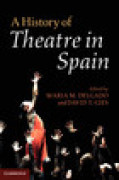
Leading practitioners and theatre historians present a new assessment of Spain's theatrical history from a performative perspective. From the religious environments of Medieval Iberia to the theatre companies established in the aftermath of Franco's demise, this collection presents a new assessment of Spain's theatrical history. Written by theatre historians and practitioners, the book features interviews with actress Nuria Espert, director LluÃs Pasqual and playwright Juan Mayorga. From the religious environments of Medieval Iberia to the theatre companies established in the aftermath of Franco's demise, this collection presents a new assessment of Spain's theatrical history. Written by theatre historians and practitioners, the book features interviews with actressNuria Espert, director LluÃs Pasqual and playwright Juan Mayorga. Leading theatre historians and practitioners map a theatrical history that moves from the religious tropes of Medieval Iberia to the postmodern practices of twenty-first-century Spain. Considering work across the different languages of Spain, from vernacular Latin to Catalan, Galician and Basque, this history engages with the work of actors and directors, designers and publishers, agents and impresarios, and architects and ensembles, in indicating the ways in which theatre has both commented on and intervened in the major debates and issues of the day. Chapters consider paratheatrical activities and popular performance, such as the comedia de magia and flamenco, alongside the works of Spain's major dramatists, from Lope de Vega to Federico GarcÃa Lorca. Featuring revealing interviews with actress Nuria Espert, director LluÃs Pasqual and playwright Juan Mayorga, it positions Spanish theatre within a paradigm that recognizes its links and intersections with wider European and Latin American practices. INDICE: Introduction Maria M. Delgado and David T. Gies; 1. The theatre inmedieval Spain: the challenges of historiography Ãüngel Gómez Moreno; 2. Playing the palace: space, place and performance in early modern Spain Margaret R. Greer; 3. The world as a stage: politics, imperialism and Spain's seventeenth-century theatre José MarÃa Ruano de la Haza; 4. Lope de Vega, Pedro Calderón de la Barca and Tirso de Molina: Spain's Golden Age drama and its legacy Jonathan Thacker; 5. The art of the actor, 1565–1833: from moral suspicion tosocial institution Evangelina RodrÃguez Cuadros; 6. Theatrical infrastructures, dramatic production and performance, 1700–1759 Fernando Doménech Rico; 7. Popular theatre and the Spanish stage, 1737–1798 Josep Maria Sala Valldaura; 8. Theatre of the elites, Neoclassicism and the Enlightenment, 1750–1808René Andioc; 9. Zarzuela: prejudice and mass culture in Spain Rafael Lamas; 10. Nineteenth-century Spanish theatre: the birth of an industry José Luis GonzÃílez SubÃas; 11. Copyright, buildings, spaces and the nineteenth-century stage Lisa Surwillo; 12. Modernism and the avant-garde in fin-de-siècle Barcelona and Madrid David George and Jesús Rubio Jiménez; 13. Continuity and innovation in Spanish theatre, 1900–1936 Dru Dougherty and Andrew Anderson; 14. Theatrical activities during the Spanish Civil War, 1936–1939 Jim McCarthy; 15. Theatre, colonialism, exile and the Americas Helena Buffery; 16. Theatre under Franco, 1939–1975: censorship, playwriting and performance John London;17. Flamenco: performing the local/performing the state Lourdes Orozco; 18. Actors and agency in the modern era, 1801–2010 Josep LluÃs Sirera; 19. Nationalism, identity and theatre: theatre across the Spanish state in the democratic era, 1975–2010 Sharon Feldman and Anxo AbuÃn GonzÃílez; 20. Directors and the Spanish stage, 1823–2010 Maria M. Delgado; 21. This evolution is stillongoing Nuria Espert; 22. Theatre as a process of discovery LluÃs Pasqual; 23. Theatre is the art of the future Juan Mayorga; Select bibliography.
- ISBN: 978-0-521-11769-2
- Editorial: Cambridge University
- Encuadernacion: Cartoné
- Páginas: 558
- Fecha Publicación: 05/04/2012
- Nº Volúmenes: 1
- Idioma: Español
